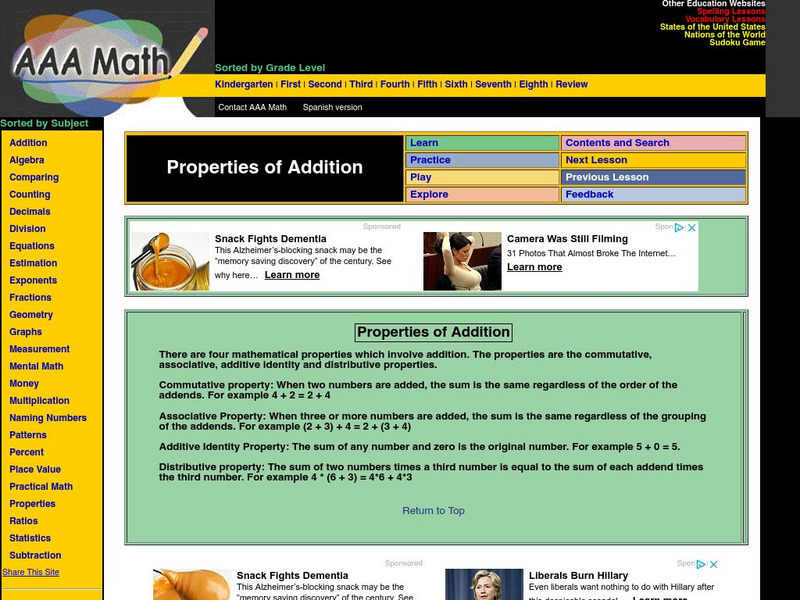Hi, what do you want to do?
Curated OER
The Schoolyard Safari
Students engage in a lesson plan to find out more information about insects. They collect and observe different insects found on school property. They research the insects once they have been classified. Also a video is used to create a...
Curated OER
Can You Name That Shape?
Learners use materials to build, investigate, and draw two-dimensional shapes (polygons). They combine the shapes they have built and draw from the pile to begin a round-robin activity to name and determine the attributes of a selection...
Curated OER
Johnny Appleseed Origami
Second graders make an origami Johnny Appleseed. In this geometry lesson students follow folding instructions. They find different geometric shapes while they are folding. They create Johnny Appleseed's body and attach a face and hands...
Curated OER
Johnny Appleseed Walkabout
Second graders calculate mileage for a journey. In this place value and measurement lesson, 2nd graders read Johnny Appleseed, work in groups to locate his birthplace on a map, locate the other states he stopped in, and measure the...
Curated OER
Measure Up!
Discover ways to measure items without standard tools. In this measurements lesson, learners estimate how long certain objects are by measuring with a non-standard measuring tool. Students check their estimates with a ruler and share...
SurfScore
Kodable
Prepare young scholars for life in the twenty-first century with this introduction to computer coding formatted as a fun problem solving game, this resource is a great way to develop children's sequential thinking...
Curated OER
Counting By 5s
Second graders count by 5's to 100. In this math lesson conducted on the 100th day of school, 2nd graders use picture stamps in the KidPix program to count by 5's and get to 100.
Curated OER
One Good Turn Deserves Another
Students make observations about shapes and 1-, 2-, and 3-dimensional objects. They conduct observations and make predictions regarding transformations of simple geometric shapes. They identify shapes that occur in household items.
Curated OER
Geoboard Squares
Students create squares of different sizes on a geoboard. They find and describe a pattern. Students use the pattern to determine the number of squares possible on a 10-by-10 geoboard. They create squares with a horizontal base (and...
Curated OER
Symme"tree"
Students practice drawing lines of symmetry after the teacher draws shapes on the board. They create a class symme"tree" using only symmetrical shapes to decorate it.
Curated OER
100 Stamps for 100 Days
Second graders count by 2's to get to 100. For this counting lesson plan, 2nd graders use the program Kid Pix to create stamps two at a time until they get to 100.
Curated OER
It's a 3-D World Out There!
Learners construct polygons. They identify attributes of three-dimensional shapes. Students name common three-dimensional shapes. They draw three-dimensional shapes, and sort three-dimensional shapes. Learners use K'NEX materials sets to...
Curated OER
BUGS-INSECTS
Learners participate in a theme study while teaching primary students basic skills according to Individual Education Plan (IEP) goals in Reading, Math, and Writing. The instructional activity is concerned primarily with the concept of...
Curated OER
Does the falling tree make a sound if no one if there to hear it? (or communication via encryption)
Young scholars explore encryption. They discuss the importance of cryptography in our daily lives. Students use games and cryptography to discover transformational geometry and modulo systems. They design their own encryption puzzles...
Curated OER
Bend It! Stretch It! Squash It!
Some items keep their shape no matter what happens! Have your kindergarten class choose which items would stay the same if they were bent, stretched, or squashed. The last activity prompts kids to see what happens when they stretch a...
Curated OER
We're Off To the Races!
Second graders use a magnet to "race" objects from one side of a racing track to another. They predict what the results are, then run the race. Pupils sort and graph which items were successfully moved, they attempt to race again. This...
Curated OER
Hot Stuff
Very young scientists who are learning about solids, liquids, melting, and freezing will use this worksheet to identify things that would melt if put in a warm place. There are eight objects altogether, and learners place a check mark...
Curated OER
Name That Critter
Young learners classify five different animals into their proper category. The animals pictured are a pigeon, a lizard, a cat, a frog, and a goldfish. Pupils are also asked to tell why they know it's a certain kind of animal. An...
Curated OER
Ocean Murals
Students identify characteristics of water. They describe the process by which light decreases and pressure increases as water depth increases. They demonstrate the principle of water pressure in a small group experiment.
Curated OER
Daily Survival Requirements of Water
Students will use inquiry science to complete an investigation. They create hypotheses predicting the changes water undergoes in becoming ice and determine how much ice needs to be melted to create one 8 oz. glass of water.
Curated OER
Honey ! I Blew Up The Bee!
Second graders complete a variety of bee-themed activities. They consider the importance of honeybees in food production, conduct Internet research, prepare foods using honey, complete puzzles and compile a portfolio of their work.
University of Texas at Austin
University of Texas: Elementary Math Club: Math Mobile
Learners explore the geometric and topological properties of three-dimensional objects. The lesson plan includes an overview and a lesson toolkit.
University of Texas at Austin
University of Texas: Elementary Math Club: A Math Mural
Students learn how to construct shapes and understand the properties of these shapes. The lesson plan includes an overview and a lesson plan toolkit.
AAA Math
Aaa Math: Properties of Addition
Explains the four mathematic properties of addition. Gives exercises and games to practice this skill.



























